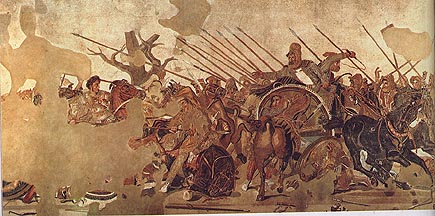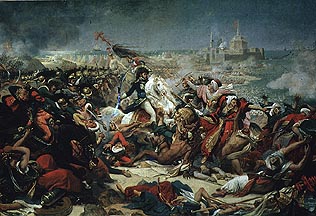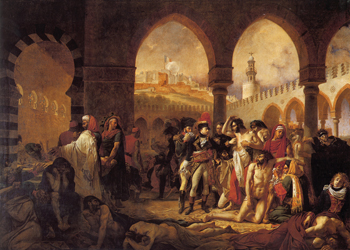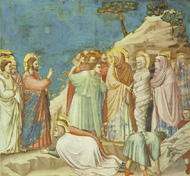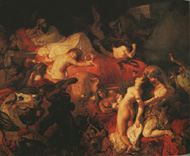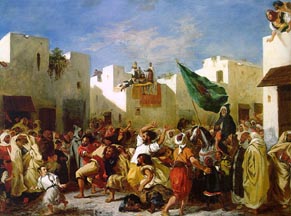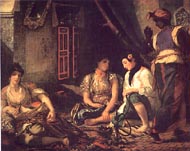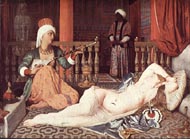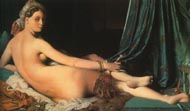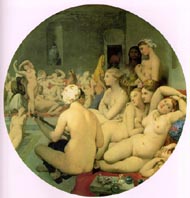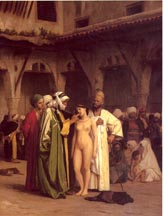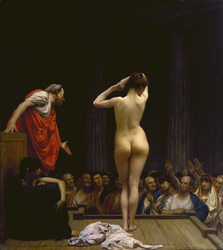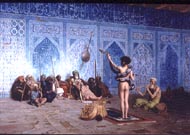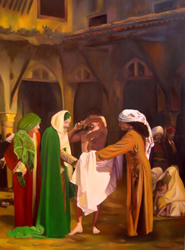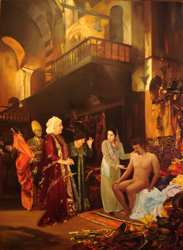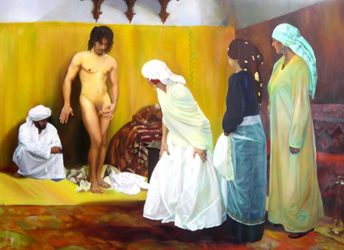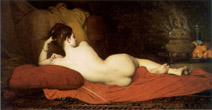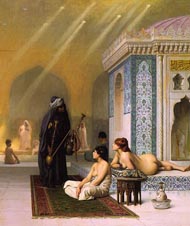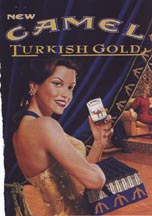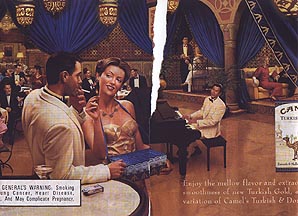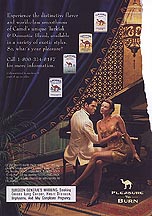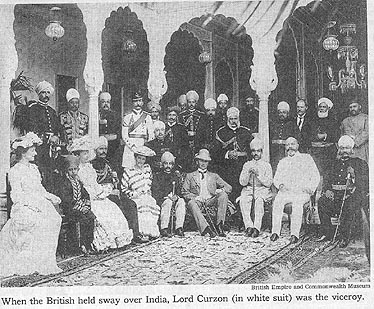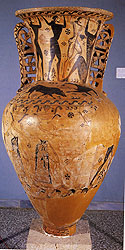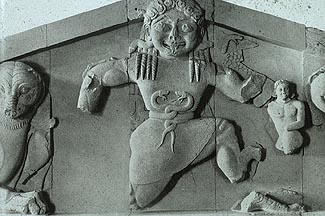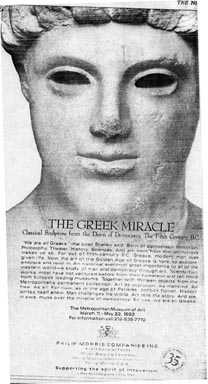Art Home | ARTH Courses | ARTH 220
Orientalism: a Gallery of Images
Alexander Mosaic probably dating from the late second or early first century BCE. found in the House of the Faun in Pompeii A floor mosaic found in the remains of a Roman house in Pompeii is likely a copy of a panel painting painted by Philoxenos of Eretria about 310 |
Baron Antoine Gros, Murat at the Battle of Aboukir, 1806, 18'11 1/2"X 31'9". Baron Antoine Gros (1771-1835) was a student of David. Like his teacher, Gros dedicated his art to producing images that recorded and glorified the military campaigns of Napoleon. These monumental history paintings are in an artistic tradition that can be traced back to Roman Imperial sculpture like the Great Trajanic Frieze and the Alexander Mosaic, both discussed above. Gros depicts the pivotal moment in the French victory over the Turkish army at the Battle of Aboukir that took place on July 25,1799. The battle was decided at noon by a cavalry charge led by General Joachim Murat that retook a key fort and captured the Turkish leader Mustapha Pasha. Gros centers his painting around the figure of Murat leading the charge against the Turkish army. Like David's equestrian image of Napoleon, Gros constrasts the wild power of the horse with the calm and controlled figure of Murat. The figure of Murat is also in stark contrast to the chaos around him. The painting with its brutal violence would be senseless without the figure of Murat at its center. |
|
Ingres, Odalisque with Slave, 1839-40. |
||
Excerpts from Edward Said, Orientalism, New York 1978: p. 1: Unlike the Americans, the French and British...have had a long tradition of what I shall be calling Orientalism, a way of coming to terms with the Orient that is based on the Orient's special place in European experience. The Orient is not only adjacent to Europe; it is also the place of Europe's greatest and richest and oldest colonies, the source of its civilizations and languages, its cultural contestant. In addition, the Orient has helped to define Europe (or the West) /p. 2: as its contrasting image, idea, personality, experience. Yet none of this Orient is merely imaginative. The Orient is an integral part of European material civilization and culture. Orientalism expresses and represents that part culturally and even ideologically as a mode of discourse with supporting institutions, vocabulary, scholarship, imagery, doctrines, even colonial bureaucracies and colonial styles.... Orientalism is a style of thought based upon an ontological and epistemological distinction between "the Orient" and (most of the time) "the occident." Thus a very large mass of writers, among whom are poets, novelists, philosophers, political theorists, economists, and imperial administrators, have accepted the basic distinction between East and West as the starting point for elaborate theories, epics, novels, social descriptions, and political accounts concerning the /p. 3: Orient, its people, "mind," destiny, and so on.... Taking the late eighteenth century as a very roughly defined starting point Orientalism can be discussed and analyzed as the corporate institution for dealing with the Orient --dealing with it by making statements about it, authorizing views of it, describing it, by teaching it, settling it, ruling over it: in short, Orientalism as a Western style for dominating, restructuring, and having authority over the Orient... My contention is that without examining Orientalism as a discourse one cannot possibly understand the enormously systematic discipline by which European culture was able to manage --and even produce-- the Orient politically, sociologically, militarily, ideologically, scientifically, and imaginatively during the post-Enlightenment period. Moreover, so authoritative a position did Orientalism have that I believe no one writing, thinking, or acting on the Orient could do so without taking account of the limitations on thought and action imposed by Orientalism. In brief, because of Orientalism the Orient was not (and is not) a free subject of thought or action.... European culture gained in strength and identity by setting itself off against the Orient as a sort of surrogate and even underground self.
Central to Said's idea of Orientalism is its function of helping the West define itself by constructing an "Other" whose characteristics were understood as being in opposition to the West. The Orient was understood to be static in time and place. It was understood as being eternal, uniform and incapable of defining itself. This was in opposition to the West which saw itself as being dynamic, innovative, and expansionist. The European sense of cultural and intellectual superiority granted to Westerners the authority of spectator to be the judge and jury of Oriental behavior. As early as 1810, the French author Chateaubriand called upon Europe to take on the responsibility of teaching the Orient about the meaning of liberty: "Of liberty, they know nothing; of propriety, they have none: force is their god [as quoted in Said, Orientalism, p. 172]." For Chateaubriand the Orientals require conquest not for Western material profit but as instruction in liberty. Conquest was understood as a redemptive act to liberate a degenerate world. The characteristics of the Oriental mind articulated in Orientalist discourse can be seen in oppositional terms to the Western mind: Oriental Mind= sensuality, tendency towards despotism, aberrant mentality, habit of inaccuracy, and backwardness; Occidental Mind= rationality, pursuit of liberty, objectivity, and emphasis on "progress." Timothy Mitchell, "Orientalism and the Exhibitionary Order," reprinted in Preziosi, The Art of Art History, p. 455: Three features define this Orientalist reality: it is understood as the product of unchanging racial and cultural essences; these essential characteristics are in each case the polar opposite of the West (passive rather than active, static rather than mobile, emotional rather than rational, chaotic rather than ordered); and the Oriental opposite or Other is, therefore, marked by a series of fundamental absences (of movement, reason, order, meaning, and so on). Said's Orientalism echoes ideas that have been in western thought as far back at least as Greek culture of the late eighth century B.C.E. This was the beginning of a period that scholars have traditionally called the Orientalizing period, which signified the importance of Greek contact with ancient Near Eastern culture that had dramatic influence on the growth of Greek culture. This contact with these cultures helped to foster a strong sense of identity among the Greeks. The concept of the barbarian was developed during this period to label anyone who was not Greek speaking. This was a period that witnessed the entrance into Greek art and imagination of a menagerie of monsters that need to be tamed by Greek hero. The most popular was the Gorgon Medusa who was decapitated by Perseus with the help of Athena. An early example of this image appears on the belly of an early seventh century B.C.E. amphora found in a cemetary in Eleusis: The Medusa, a symbol of both Greek misogyny and xenophobia, acquired its canonical form by the time of its inclusion in the pediment of the Temple of Artemis at Corfu from the middle of the sixth century: It is hard to underestimate the importance of the Classical period of the fifth as a defining moment of Western culture. An advertisement for an exhibition entitled The Greek Miracle: Classical Scupture from the Dawn of Democracy at the Metropolitan Museum of Art fully exploits this cultural heritage: The text begins with the proud statement from Shelley that "We are all Greeks." Excerpts from a Speech by Arthur James Balfour I take up no attitude of superiority. But I ask anyone ... who has even the most superficial knowledge of history, if they will look in the face the facts with which a British statesman has to deal when he is put in a position of supremacy over great races like the inhabitants of Egypt and countries in the East. We know the civilization of Egypt better than we know the civilization of any other country. We know it further back; we know it more intimately; we know more about it. It goes far beyond the petty span of the history of our race, which is lost in the prehistoric period at a time when the Egyptian civilization had already past its prime. Look at all the Oriental countries. Do not talk about superiority or inferiority.... First of all, look at the facts of the case. Western nations as soon as they emerge into history show the beginnings of those capacities for self-government...having merits of their own.... You may look through the whole history of the Orientals in what is called, broadly speaking, the East, and you never find traces of self-government. All their great centuries --and they have been very great-- have been passed under despotisms, under absolute government. All their great contributions to civilization --and they have been great-- have been made under that form of government. Conqueror has succeeded conqueror; one domination has followed another; but never in all the revolutions of fate and fortune have you seen one of these nations of its own motion establish what we, from a Western point of view, call self-government. That is the fact. It is not a question of superiority and inferiority. I suppose a true Eastern sage would say that the working government which we have taken upon ourselves in Egypt and elsewhere is not a work worthy of a philosopher --that it is the dirty work, the inferior work, of carrying on the necessary labor.... Is it a good thing for these great nations --I admit their greatness-- that this absolute government should be exercised by us? I think it is a good thing. I think that experience shows that they have got under it far better government than in the whole history of the world they ever had before, and which not only is a benefit to them, but is undoubtedly a benefit to the whole of the civilized West.... We are in Egypt not merely for the sake of the Egyptians, though we are there for their sake; we are there also for the sake of Europe at large.... To be more explicit, what is meant when it is said that the commercial spirit should be under some control is this --that in dealing with Indians or Egyptians or Zulus, the first question is to consider what these people, who are all, nationally speaking, more or less in statu pupillari , themselves think is best in their own interests, although this is a point which deserves serious consideration. But it is essential that each special issue should be decided mainly with reference to what, by the light of Western knowledge and experience tempered by local considerations, we conscientiously think is best for the subject race, without reference to any real or supposed advantage which may accrue to England as a nation, or --as is more frequently the case-- to the special interests represented by some one or more influential classes of Englishmen. If the British nation as a whole persistently bears this principle in mind, and insists sternly on its application, though we can never create a patriotism akin to that based on affinity of race or community of language, we may perhaps foster some sort of cosmopolitan allegiance grounded on the respect always accorded to superior talents and unselfish conduct, and on the gratitude derived from favors conferred and from those to come.... Excerpt from Cromer's Modern Egypt Sir Alfred Lyall once said to me: "Accuracy is abhorrent to the Oriental mind. Every Anglo-Indian should always remember that maxim." Want of accuracy, which easily degenerates into untruthfulness, is in fact the main characteristic of the Oriental mind. The European is a close reasoner; his statements of fact are devoid of any ambiguity; he is a natural logician, albeit he may not have studied logic; he is by nature sceptical and requires proof before he can accept the truth of any proposition; his trained intelligence works like a piece of mechanism. The mind of the Oriental, on the other hand, like his picturesque streets, is eminently wanting in symmetry. His reasoning is of the most slipshod description. Although the ancient Arabs acquired in a somewhat higher degree the science of dialectics, their descendants are singularly deficient in the logical faculty. They are often incapable of drawing the most obvious conclusions from any simple premises of which they may admit the truth. Endeavor to elicit a plain statement of facts from any ordinary Egyptian. His explanation will generally be lengthy, and wanting in lucidity. He will probably contradict himself half-a-dozen times before he has finished his story. He will often break down under the mildest process of cross-examination.... In 1910 the French advocate of colonialism Jules Harmand said: "It is necessary, then, to accept as a principle and point of departure the fact that there is a hierarchy of races and civilizations, and that we belong to the superior race and civilization, still recognizing that, while superiority confers rights, it imposes strict obligations in return. The basic legitimation of conquest over native peoples is the conviction of superiority, not merely our mechanical, economic, and military superiority, but our moral superiority. Our dignity rests on that quality, and it underlines our right to direct the rest of humanity. Material power is nothing but a means to that end." [As quoted in Edward Said, Culture and Imperialism ,p. 17] Aimé Césaire, Discourse on Colonialism, p.10-11: ...[W]hat, fundamentally, is colonization? You agree on what it is not: neither evangelization, nor a philanthropic enterprise, nor a desire to push back the frontiers of ignorance, disease, and tyranny, nor a project undertaken for the greater glory of God, nor an attempt to extend the rule of law. To admit once for all, without flinching at the consequences, that the decisive actors here are the adventurer and the pirate, the wholesale grocer and the ship owner, the gold digger and the merchant, appetite and force, and behind them, the baleful projected shadow of civilization which, at a certain point in its history, finds itself obliged, for internal reasons, to extend to a world scale the competition of its antagonistic economies. Pursuing my analysis, I find that hypocrisy is of recent date; that neither Cortez discovering Mexico from the top of the great teocalli, nor Pizarro before Cuzco (much less Marco Polo before Cambaluc), claims that he is the harbinger of a superior order; that they kill; that they plunder; that they have helmets, lances, cupidities; that the slavering apologists came later; that the chief culprit in this domain is Christian pedantry, which laid down the dishonest equation Christianity=civilization, paganism=savagery , from which there could not but ensue adominable colonialist and racist consequences, whose victims were to be the Indians, the yellow peoples, and the Negroes. President Bush, Remarks by the President to Military Personnel and Families, Trent Field,Fort Stewart, Georgia 9/12/03: No free nation can be neutral in the fight between civilization and chaos. Terrorists in Iraq have attacked representatives of the civilized world, and opposing them and defeating them must be the cause of the civilized world. Web-Sites Devoted to the topic of Orientalism: "Eurocentrism and its Avatars: The Dilemmas of Social Science", by Immanuel Wallerstein, Binghamton University. "The Roots of Muslim Rage" by Bernard Lewis, Atlantic, October, 1990. Orientalism. "The Orient signifies a system of representations framed by political forces that brought the Orient into Western learning, Western consciousness, and Western empire. The Orient exists for the West, and is constructed by and in relation to the West. It is a mirror image of what is inferior and alien ("Other") to the West." Wikipedia entry on Orientalism Orientalism part of site dedicated to Colonial and Postcolonial Literary Dialogues.
|
||
